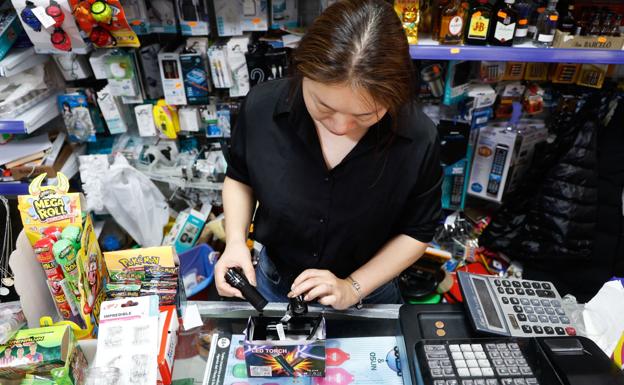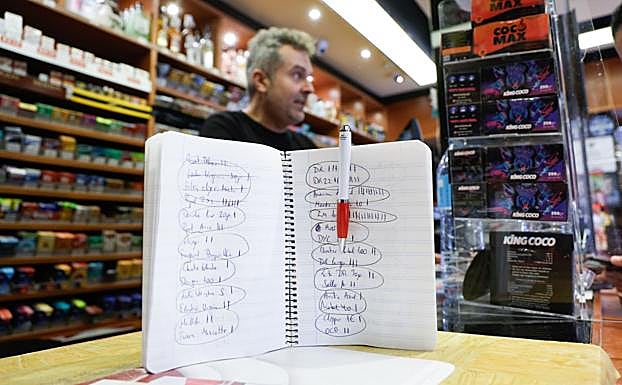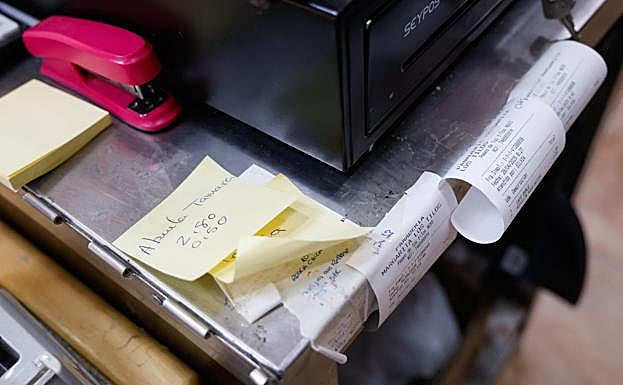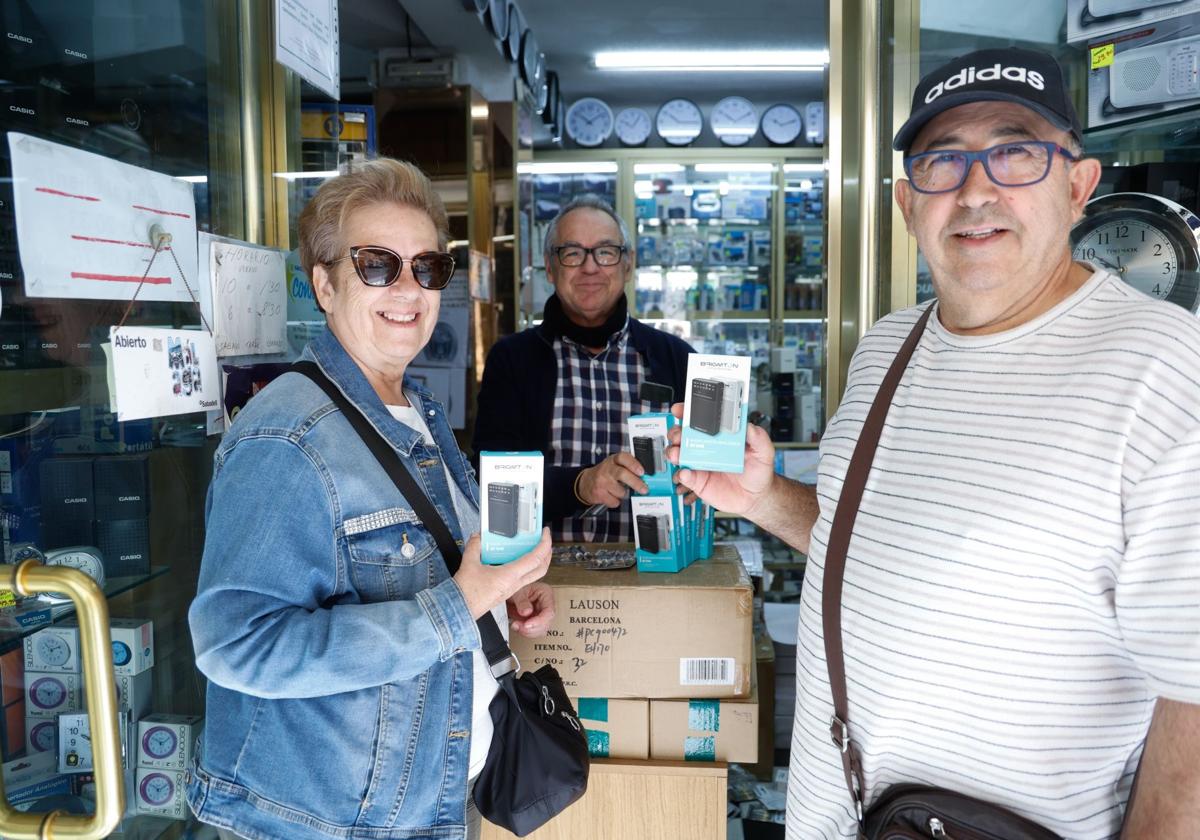Analogue makes comeback: shops make a killing with batteries, torches, camping stoves and radios
Supermarkets and convenience stores ran out of bread and water on Monday and went back to offering credit to regular customers
It may seem unbelievable, but there are people who only on Tuesday morning realised that there was a huge blackout that caused chaos and uncertainty and largely suspended economic activity throughout the day on Monday. A resident of Malaga's Cruz del Humilladero neighbourhood said: "I fell asleep on the sofa, went to bed and woke up as per usual this morning."
Power and internet were back in the neighbourhood well after midnight, in the early hours of the morning. Other neighbours, however, were very distressed to see that the electricity and internet were out, without them knowing why. The crisis caused people to stock up on battery-powered radios - the old-school ones that don't need a telematic or electrical network to work - throughout Monday afternoon and Tuesday morning. Digital is dead, analogue is back.
Estrecho de Gibraltar is a shop that sells clock and radio supplies on Calle de la Unión. A long queue quickly formed after the blackout started and owner Mario Fernández said: "How many radios have I sold? Countless. I've already opened a few boxes of 50 each." Because he didn't let customers into the shop, he improvised a counter at the door.
As a veteran shopkeeper, who has been running the business for about four decades, Mario knows that there is no greater promotion than a queue. Cristóbal González, a retired carpenter, said that he wanted to stay informed, as he was without electricity, water and internet, which prompted him to buy a battery-powered radio and join the queue.
At the Hermanos Moreno hardware store on Calle Don Juan de Austria, owner Daniel Moreno said that during the afternoon of the blackout he sold the equivalent of two months' worth of batteries, torches and camping gas.
"Turnover was 60-70% higher than on a normal day," said Moreno. "On Monday morning we did close a little earlier than usual, but power returned to the neighborhood around 4pm and our card reader worked until about 6pm. After that, we only accepted cash. We only offered credit to our regular customers," he said.
The popular bazaar or 'Chinese' shops were also crowded yesterday, for the same reasons. One of these establishments confirmed that it had ran out of candles and large batteries. Meanwhile, Yang, a shop assistant in one of its competitors, reported feeling very stressed upon realising that a lot of the torches that people rushed to buy weren't working. "I ran out of the ones that worked. These other ones I have here don't work. As my mobile phone didn't work, I couldn't call anyone to bring me stock from the industrial estate," she said.

Zoom

Queues also formed at petrol stations this morning. "People are filling up their tanks as if the world is going to end," said Laura, an employee at one of the stations. "We sold a lot of water, a lot of tobacco and also a lot of bread and butane gas. The shop was full and we decided to give service through the window for security reaasons."
According to estimates, her shop made around 2,000 euros in cash from tobacco sales alone. "All sales were written down manually, with a pen, and now we have to enter them into the computer," they said.
Daniel Campano, a shop assistant at the tobacco shop across the street, said the same thing: "I wrote everything down in a notebook and now we have to enter it into the database. People were quite nervous. I was the last one to close on the street. I'm sure I must have lost some customers, because there were some who complained to me that I had sold tobacco to someone and not to him, but I had to close at some point."

Zoom

Radios, batteries, stoves, butane canisters.... What about food? Ovafa was busy shopping at Lidl: the only thing she bought on Monday was bread for sandwiches, because she couldn't make much more without electricity. Fran filled his cart with bottles of water, as the power cut caused his motor to fail and he was left without water supply. It is precisely those two goods - bread and water - that were bought in large proportions on Monday.
Employees at the Margarita bakery know it well: "We ran out of bread, water and piquitos. The empanadas were also gone in the split of a second, because people couldn't cook. My shift is in the morning. I left at 1.30pm and then I came back in the afternoon to support my colleague; there were so many customers that she couldn't cope. We had to do the accounts with a calculator, the dataphone only worked at times, so we had to offer credit a lot: we have the post-it notes with that," said Silvia Martín.

Zoom

Some shops even gave the bread away, because they couldn't charge for it and because it was going to go bad anyway.
"The day was chaotic. The blackout caught us with customers in the shop. The phones didn't work, nobody could be reached. At first, we thought it was our issue, then we thought it was something on the street and then we found out it was Spain-wide, although we thought it was a joke. We evacuated the shop. We have a battery system to keep the basics going and now we have to check the damage inventory. Everything was working fine this morning," said a worker at a supermarket chain.
An Aldi manager said that some fridges are equipped with generators, thanks to which the food survived. He said that they have not assessed damages yet, but they do believe that it will be considerable, seeing as Saturdays and Mondays are the busiest days for revenue.
"At 12.50pm, we stopped cashing out and decided to close at 1pm, when the door locking system started to fail. I live nearby and I know that the power came back on at 3.10am. We were here by 5.30pm and saw that everything was working again. It could have been worse," he said.
But for the food to last, you need to have the means for its preservation. Álvaro Bermúdez, from Cárnicas Matahambre, said that any butcher's shop works with chambers that have 18 hours of cold storage, but in order for the raw material not to spoil, it has to be put away quickly. "We put the meat away and stopped serving the public. People came in here asking for bread to make sandwiches, because they couldn't prepare the meat, as there was no electricity", he said.
According to Cristina and Maricarmen, two shop assistants in Cruz del Humilladero, those with less work today are the fishmongers: "There are few sales, because people think there is no fish. Or because yesterday they bought enough food for several days. Or because they are throwing away what has defrosted in the fridge."

